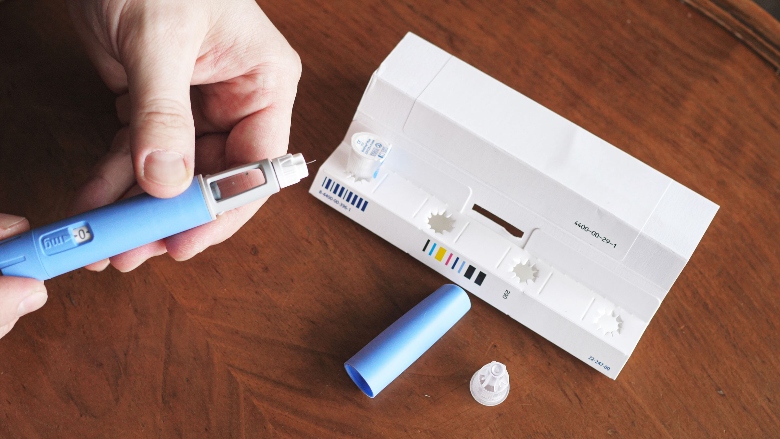Weight loss drugs touted as modern miracles are making headlines worldwide. Promising rapid results for those struggling with obesity, they are celebrated as game-changers in tackling weight-related health issues. However, the tragic death of a Scottish nurse after taking the injectable drug Mounjaro (tirzepatide) raises serious questions about their safety and the risks associated with their widespread use.
Susan McGowan, a 58-year-old nurse from Scotland, dedicated three decades to the National Health Service (NHS), providing care and medical advice to patients. She likely believed in the systems and protocols she worked within—a belief that may have contributed to her decision to take Mounjaro, a weight-loss drug recently approved by the NHS.
Eric Thompson Podcast
Just weeks after starting the treatment, McGowan’s life took a devastating turn. After two injections of the drug, she began experiencing severe health complications, ultimately leading to her hospitalization. Her condition rapidly deteriorated, with doctors informing her family that her kidneys were failing. Soon after, she fell into a coma and succumbed to multiple organ failure, septic shock, and pancreatitis.
The official autopsy report listed tirzepatide, the active ingredient in Mounjaro, as a contributing factor in her death. McGowan’s passing marks the first officially recorded fatality linked to the drug in the United Kingdom, sparking concerns over its safety and regulatory approval.
Mounjaro, also sold under the brand name Zepbound, is manufactured by pharmaceutical giant Eli Lilly. Originally developed as a treatment for type 2 diabetes, tirzepatide belongs to a class of drugs known as GLP-1 receptor agonists. These medications regulate blood sugar levels and have the added benefit of suppressing appetite, making them highly effective for weight loss.
Given its dual role, Mounjaro quickly became a go-to option for individuals seeking to lose weight. Its approval by the NHS opened the door for broader accessibility in the U.K., making it one of the most sought-after treatments for obesity.
But as McGowan’s case illustrates, the drug’s benefits may come at a steep price.
While hailed as transformative, GLP-1 receptor agonists like tirzepatide carry significant risks. Common side effects include nausea, vomiting, diarrhea, and stomach paralysis. More severe complications such as pancreatitis, kidney disease, and even thyroid cancer have been reported in rare cases.
Alarmingly, the drugs have also been linked to suicidal thoughts, prompting some experts to advocate for a black-box warning—the FDA’s strictest caution—for pregnant women and other at-risk groups.
Clinical trials have further highlighted the potential dangers. Studies reveal that 80% to 90% of participants experienced at least one adverse reaction while on the medication. Although many of these side effects were considered mild to moderate, they were severe enough for some individuals to discontinue the treatment altogether.
McGowan’s death is a grim reminder of the risks tied to new medical treatments, even those approved by trusted regulatory bodies like the NHS. Critics argue that the push to adopt such drugs reflects broader systemic issues, including the pharmaceutical industry’s prioritization of profits over patient safety.
The case also sheds light on the growing reliance on weight-loss medications as quick fixes for complex health problems. Advocates for holistic health approaches warn against the overprescription of such treatments, urging a focus on lifestyle changes and addressing the root causes of obesity instead.
McGowan’s family, meanwhile, is left grappling with the devastating consequences of her decision to trust a drug that promised life-changing results. Her story serves as a cautionary tale for others considering similar treatments.
The incident has sparked debate over the role of weight-loss medications in modern healthcare. Are these drugs genuinely revolutionary, or do they pose more harm than good?
For McGowan and others like her, the risks became tragically real. As the medical community investigates the safety of GLP-1 receptor agonists, patients and providers alike are left to weigh the potential benefits against the undeniable dangers.
McGowan’s case raises critical questions: Should regulatory bodies reassess the safety standards for such medications? Is there enough transparency about their risks? And how can healthcare systems better protect patients from preventable tragedies?
As the story unfolds, one thing is clear: Miracle drugs, no matter how promising, are not without their costs. McGowan’s death underscores the importance of vigilance, informed decision-making, and the ongoing need to scrutinize the claims surrounding new medical treatments.
This heartbreaking case highlights the delicate balance between innovation and safety in medicine. While weight-loss drugs like Mounjaro may offer hope to millions, McGowan’s story reminds us that every “miracle” comes with risks—and sometimes, the cost is too high.



